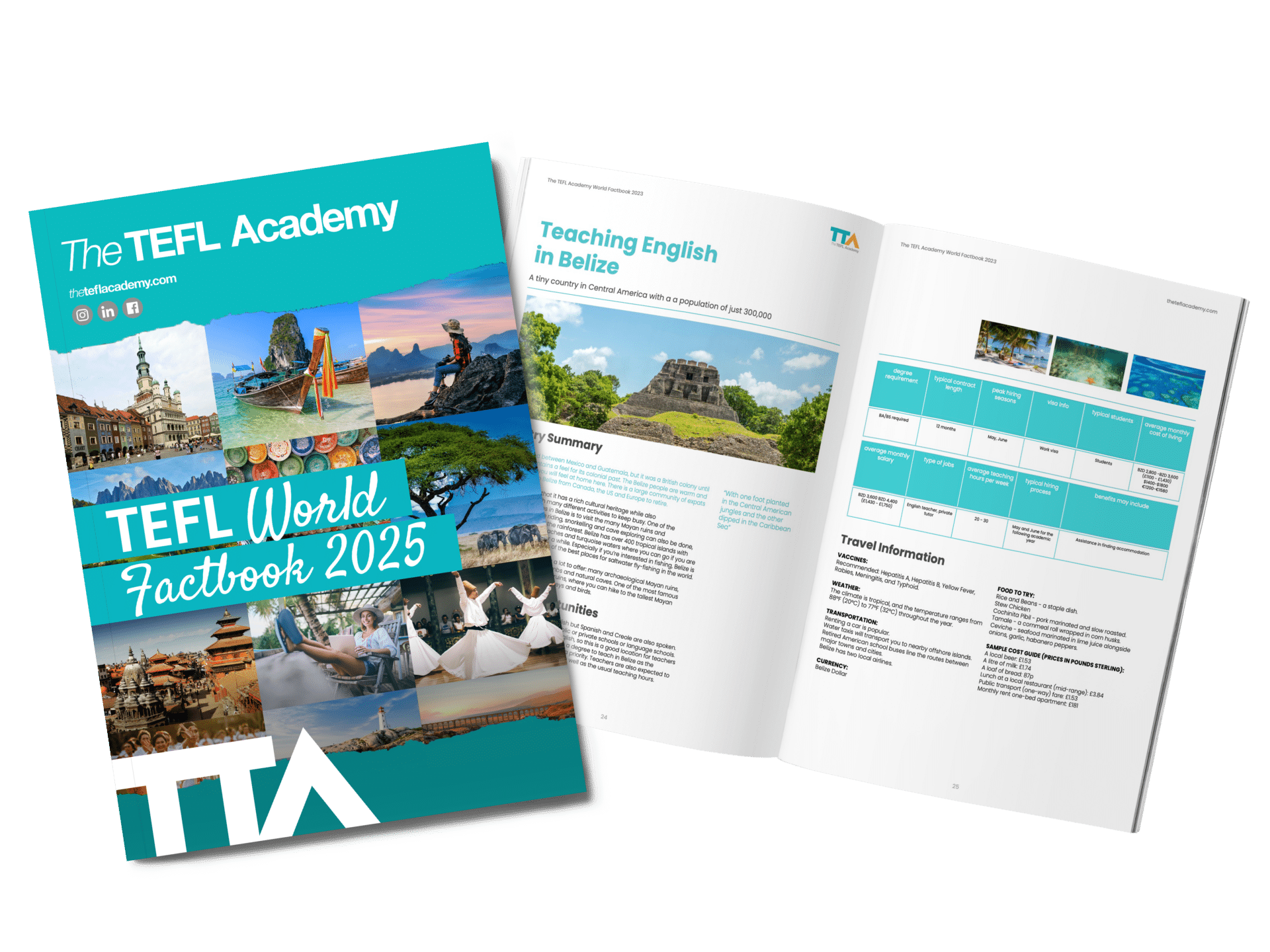Teach English in Indonesia
a world of opportunities
Join a global community of over 200,000 TEFL teachers working throughout the world! Enrol me!
Content
Why teach in Indonesia
Where to teach
Other popular places
Teaching requirements
What is not required
Types of teaching jobs
How to get a job
Salary and benefits
Common benefits
Cost of living & culture
Saving in Indonesia
Life and culture
Are you keen to break free from your everyday life and explore gorgeous beaches and islands? Do you want to experience rich cultural heritage while surfing some of the best spots in the world? Then Indonesia is the place for you.
As an English teacher in Indonesia you’ll be surrounded by pristine beaches, forests and mountains. Those interested in culture will be spoilt for choice by the historical sites and museums. The best part of Indonesia is probably its people: friendly outgoing people from different races and religions that make Indonesia a diverse and memorable country.
Let’s look at what it is really like teaching English in Indonesia and what you need to be successful on your TEFL journey in one of the most breathtaking countries in the world.
Why start teaching English in Indonesia?
Indonesia is a huge country with 17,000 islands – and even more visitors exploring the beautiful Indonesian tourist spots. Due to the large influx of tourists, English is becoming more and more important for economic growth in Indonesia. Therefore there are great opportunities for English teachers in Indonesia to teach at public schools, non-government organisations, and through established language training schools.
Here are a few of our fave reasons to teach English in Indonesia:
- A good work life balance. Work weeks in Indonesia are usually between 20 – 25 hours per week, so you will have ample time to travel and explore.
- Good way of life. Salaries are generous and teachers can live a comfortable lifestyle in Indonesia. Teachers can expect benefits like paid vacation and sick leave.
- Countless travel opportunities. The country is vast and beautiful. You can travel very cheaply between the islands and cities to explore Indonesia. Accommodation at beautiful beach side resorts are surprisingly affordable. For a bit more money you can easily hop over to other South East Asian countries like Singapore and Thailand.
Delicious cuisine. Indonesian food is full of flavour and colour. Street food is popular as well as delicious. Don’t leave without trying broth-soaked noodles, fiery curries, banana-wrapped fish and vegetable salads with sweet peanut dressing.
Best places for English teaching jobs in Indonesia
The growth of the tourism industry in Indonesia has stimulated the English teaching market in the country. You’ll be able to choose any city in Indonesia to start your teaching journey. But here are a few cities that are ideal for teaching.
Bali
Best for island vibes
Bali is a well-known island in Indonesia, famous especially for its mountains, rice paddies, breathtaking beaches and coral reefs. Bali is filled with resorts, bars and restaurants. If you want to live in an exciting city then Bali is the place for you. Here teachers will find a wide variety of English teaching jobs. Be warned: because of the popularity of Bali, there is a lot of competition for teaching jobs.
Jakarta
Best for city folk
Jakarta is the capital of Indonesia and on the island of Java. The city is huge with about 11 million citizens. Jakarta is always busy and here you can live a vibrant, fast-paced lifestyle. Most of the English teaching jobs in Indonesia are located in Jakarta. It’s a great place to start your teaching journey in Indonesia, but many teachers find the busy city living a bit too much and move to smaller islands.
Other popular places
Surabaya is Indonesia’s second largest city and also located on the island of Java. The city has very interesting architecture and history-lovers will really enjoy this city. The city has a lot of international schools and is ideally located to travel to nearby Bali (45 minutes by plane).
Bandung is the capital of West Java and is a lively university town. Here you will be surrounded by volcanoes, sprawling tea plantations, lakes, and forests. You can easily get to Jakarta with a 2-hour car ride or 4-hour train ride. There are a number of international schools in Bandung.
Yogyakarta is also located on the island of Java. Yogyakarta is known for its cultural heritage and traditional arts. With 19 universities located in the city, there is a large student population that creates a lot of teaching opportunities for teachers.
What will I need to qualify to teach in Indonesia?
Let’s unpack these requirements in a bit more detail.
Native speaker requirements
Employers in Indonesia are by law required to only employ native English speakers. The country has a specific list of native English-speaking countries and visas are only issued to teachers from these countries. You have to be a citizen from the United States, United Kingdom, Ireland, Australia, New Zealand, Canada, and South Africa.
A TEFL certification
Most schools in Indonesia require you to have a TEFL certificate to teach English in Indonesia. If you are serious about teaching English in Indonesia then the best thing you can do is get yourself TEFL qualified with a TEFL certificate that has a minimum of 120 hours.
A TEFL course from The TEFL Academy teaches you the fundamentals of teaching English as a foreign language – everything you need to know to set foot in the classroom with confidence. The TEFL Academy is the perfect partner to help you get qualified and take the first step to finding that perfect job in Indonesia.
Degree requirements
You need a Bachelor’s degree to teach English in Indonesia. Your degree does not have to be in English or Education, any field will do.
Work visa
Most teachers enter Indonesia with a visa on arrival. This might sound ideal, but this is not the best way to live and work in Indonesia as you’ll have to leave the country to apply for a working visa. We highly recommend that you enter the country with a pre-approved B211 visa. This visa will help you avoid having to do visa runs – which often involve long days, even longer queues and sweaty bus rides. Once you have found employment in Indonesia your schools will assist you with obtaining a KITAS visa.
Capital for basic start-up costs
Start-up costs are the basic costs you will need to survive from when you arrive in Indonesia until you receive your first paycheque. Most schools in Indonesia will not pay you upfront, so it is important to have between $700 and $1, 100 USD available to set yourself up in Indonesia. Below is a breakdown of costs you might incur to start off in Indonesia:
Accommodation: Usually provided.
TEFL certification: A TEFL course can cost between $100 and $500, depending on the length and level of the course and the course provider.
Document fees: Any costs related to certifying and notarising your degree and TEFL certificate.
Flight ticket: Variable.
Visa application: The cost of a visa is subject to your home country. A visa on arrival costs $35, while a B211 visa costs around $230.
Living expenses: You will need one month’s worth of start-up capital of about $450.
What is not required to qualify to teach English in Indonesia?
Teaching experience is not that important to get an English teaching job in Indonesia. It is more important that you have a TEFL certification and that’s exactly why The TEFL Academy is here!
Types of teaching jobs in Indonesia
Learning English in Indonesia is very popular and you can choose from a range of different teaching jobs.
Language schools
Some children and adults attend language schools after school or in the evening to improve their English. As a teacher it is easy to get a job at these centres because the demand is high for these classes and the centres hire throughout the year. Each centre has their own curriculum and they provide you with teaching materials.
Preschools and kindergartens
Teaching English to 18-month olds to six-year olds is very common in Indonesia. There are a lot of positions available at preschools and kindergartens in big cities like Jakarta. The teaching environment in these schools are warm and friendly and you’ll have a teaching assistant with you. You’ll receive teaching material and have small class sizes.
International schools
These schools are very popular amongst the wealthy in Indonesia. The tuition is expensive and getting in is very competitive. Salaries at these schools are very good but require a teaching license and a degree. International schools in Indonesia follow the International Baccalaureate (IB) or the A-level curriculum. If you have experience with these curricula you should be able to find a job easily.
How to get a job teaching English in Indonesia
The first step is to update your CV. Highlight your teaching experience, whether that experience is in the classroom, on your TEFL course, or in another capacity.
Here are our top tips for getting a job teaching English in Indonesia:
- You can look for a job all year round, but jobs might be fewer around Islamic holidays.
- Schools in Indonesia prefer to interview teachers ahead of time, meaning that you’ll have a telephone interview or Zoom call in your home country before you arrive in Indonesia.
- If you’re serious about teaching, get a work visa before you enter Indonesia. Some schools may assist you with this.
- Indonesia only grants work visas to citizens from the United States, United Kingdom, Ireland, Australia, New Zealand, Canada, and South Africa (these are classified as native English-speaking countries).
Average salary and benefits for teaching English in Indonesia
Different types of schools offer different salaries and benefits in Indonesia.
- On average a teacher in Indonesia can expect to make between Rp 9 million and Rp14 million ($600 and $1,000) a month.
- In language schools, teachers earn around Rp9 million ($600) a month.
- Preschools and kindergartens pay Rp8.8 million – Rp million ($650 – $1,500) a month.
Teachers at international schools can expect salaries of Rp30 million – Rp45 million ($2, 00 – $3,000) a month.
What are the common benefits for teachers in Indonesia?
It is not common to receive accommodation as a teacher in Indonesia. In rare cases schools will provide you with money to reimburse your flight, but don’t count on it. Teachers with contracts will receive paid vacation days and sick days. International schools have the best benefits, but it’s difficult to find a job at these schools.
What's the cost of living in Indonesia?
Salaries in Indonesia are not as high as in other Asian countries, but the cost of living is also not that high. You may not be able to save a lot but you will enjoy a comfortable lifestyle.
Here are common costs for living in Indonesia:
Accommodation
- One-bedroom apartment in city centre: Rp4 million ($280)
- One-bedroom apartment outside city centre: Rp2.5 million ($165)
Utilities
- Electricity, water, and gas: Rp 1.6 million ($110) a month
Food and groceries
- Monthly shop: Rp 1.8 million ($125)
- Meal at an inexpensive restaurant: Rp25,000 ($1.50)
Transport
- Monthly pass: Rp 180,000 ($12)
- One-way ticket: Rp 5,000 ($0.30)
Internet
- Unlimited: Rp 225,000 ($15)
Entertainment
- Gym, cinema, going out: Rp 2.2 million ($150)
Is it possible to save as a TEFL teacher in Indonesia?
If we’re being real with you, don’t expect to save money as a TEFL teacher in Indonesia. Teachers teaching in Indonesia mostly break even each month. You’ll be able to cover your rent and expenses, and go out and enjoy Indonesia. You can increase your chances of saving money by taking on private tutoring classes or online teaching.
What's it like to live and work in Indonesia?
- Living and working in Indonesia gives you the opportunity to immerse yourself in a new culture, explore breathtaking beaches and landscapes and make friends for life.
- Indonesia can be described as a sensory overload and it is important that you are aware of this when moving to a big city like Jakarta. The noise, traffic jams, poverty and shanty towns might be overwhelming.
- Time is a big adjustment in Indonesia. Jam karet is fondly referred to as “rubber time” in Indonesia. People are often late in Indonesia and meetings might get cancelled for no apparent reason.
- As a teacher you should know the concept of saving face in Asian countries. It is important to not publicly criticize or reprimand someone in Indonesia.
- In Indonesia 86% of the population practice Islam. Teachers should dress modestly in the classroom. Female teachers should cover their shoulders and wear longer length skirts and trousers. Men are expected to wear long pants.
- In Indonesia students are very motivated to learn English and are in general polite. You can expect fewer problems with discipline than what you might experience in European schools.
- The food in Indonesia is an experience by itself, especially the street food. You can find a wide variety of traditional Indonesian and South East Asian dishes. For the less adventurous there are many restaurants that offer a wide range of different cuisines.
- Indonesian transport will take some time to get used to. In big cities public transport is cheap, but extremely crowded. Ferries are a great way to get around, but they are not always on time. Getting your own scooter might be an affordable and fun way to get around in Indonesia.
Indonesia will be nothing but an adventure and you will definitely have a life-changing experience teaching English to friendly, outgoing students.
Content
Are you keen to break free from your everyday life and explore gorgeous beaches and islands? Do you want to experience rich cultural heritage while surfing some of the best spots in the world? Then Indonesia is the place for you.
As an English teacher in Indonesia you’ll be surrounded by pristine beaches, forests and mountains. Those interested in culture will be spoilt for choice by the historical sites and museums. The best part of Indonesia is probably its people: friendly outgoing people from different races and religions that make Indonesia a diverse and memorable country.
Let’s look at what it is really like teaching English in Indonesia and what you need to be successful on your TEFL journey in one of the most breathtaking countries in the world.
Why start teaching English in Indonesia?
Indonesia is a huge country with 17,000 islands – and even more visitors exploring the beautiful Indonesian tourist spots. Due to the large influx of tourists, English is becoming more and more important for economic growth in Indonesia. Therefore there are great opportunities for English teachers in Indonesia to teach at public schools, non-government organisations, and through established language training schools.
Here are a few of our fave reasons to teach English in Indonesia:
- A good work life balance. Work weeks in Indonesia are usually between 20 – 25 hours per week, so you will have ample time to travel and explore.
- Good way of life. Salaries are generous and teachers can live a comfortable lifestyle in Indonesia. Teachers can expect benefits like paid vacation and sick leave.
- Countless travel opportunities. The country is vast and beautiful. You can travel very cheaply between the islands and cities to explore Indonesia. Accommodation at beautiful beach side resorts are surprisingly affordable. For a bit more money you can easily hop over to other South East Asian countries like Singapore and Thailand.
Delicious cuisine. Indonesian food is full of flavour and colour. Street food is popular as well as delicious. Don’t leave without trying broth-soaked noodles, fiery curries, banana-wrapped fish and vegetable salads with sweet peanut dressing.
Best places for English teaching jobs in Indonesia
The growth of the tourism industry in Indonesia has stimulated the English teaching market in the country. You’ll be able to choose any city in Indonesia to start your teaching journey. But here are a few cities that are ideal for teaching.
Bali
Best for island vibes
Bali is a well-known island in Indonesia, famous especially for its mountains, rice paddies, breathtaking beaches and coral reefs. Bali is filled with resorts, bars and restaurants. If you want to live in an exciting city then Bali is the place for you. Here teachers will find a wide variety of English teaching jobs. Be warned: because of the popularity of Bali, there is a lot of competition for teaching jobs.
Jakarta
Best for city folk
Jakarta is the capital of Indonesia and on the island of Java. The city is huge with about 11 million citizens. Jakarta is always busy and here you can live a vibrant, fast-paced lifestyle. Most of the English teaching jobs in Indonesia are located in Jakarta. It’s a great place to start your teaching journey in Indonesia, but many teachers find the busy city living a bit too much and move to smaller islands.
Other popular places
Surabaya is Indonesia’s second largest city and also located on the island of Java. The city has very interesting architecture and history-lovers will really enjoy this city. The city has a lot of international schools and is ideally located to travel to nearby Bali (45 minutes by plane).
Bandung is the capital of West Java and is a lively university town. Here you will be surrounded by volcanoes, sprawling tea plantations, lakes, and forests. You can easily get to Jakarta with a 2-hour car ride or 4-hour train ride. There are a number of international schools in Bandung.
Yogyakarta is also located on the island of Java. Yogyakarta is known for its cultural heritage and traditional arts. With 19 universities located in the city, there is a large student population that creates a lot of teaching opportunities for teachers.
What will I need to qualify to teach in Indonesia?
Let’s unpack these requirements in a bit more detail.
Native speaker requirements
Employers in Indonesia are by law required to only employ native English speakers. The country has a specific list of native English-speaking countries and visas are only issued to teachers from these countries. You have to be a citizen from the United States, United Kingdom, Ireland, Australia, New Zealand, Canada, and South Africa.
A TEFL certification
Most schools in Indonesia require you to have a TEFL certificate to teach English in Indonesia. If you are serious about teaching English in Indonesia then the best thing you can do is get yourself TEFL qualified with a TEFL certificate that has a minimum of 120 hours.
A TEFL course from The TEFL Academy teaches you the fundamentals of teaching English as a foreign language – everything you need to know to set foot in the classroom with confidence. The TEFL Academy is the perfect partner to help you get qualified and take the first step to finding that perfect job in Indonesia.
Degree requirements
You need a Bachelor’s degree to teach English in Indonesia. Your degree does not have to be in English or Education, any field will do.
Work visa
Most teachers enter Indonesia with a visa on arrival. This might sound ideal, but this is not the best way to live and work in Indonesia as you’ll have to leave the country to apply for a working visa. We highly recommend that you enter the country with a pre-approved B211 visa. This visa will help you avoid having to do visa runs – which often involve long days, even longer queues and sweaty bus rides. Once you have found employment in Indonesia your schools will assist you with obtaining a KITAS visa.
Capital for basic start-up costs
Start-up costs are the basic costs you will need to survive from when you arrive in Indonesia until you receive your first paycheque. Most schools in Indonesia will not pay you upfront, so it is important to have between $700 and $1, 100 USD available to set yourself up in Indonesia. Below is a breakdown of costs you might incur to start off in Indonesia:
Accommodation: Usually provided.
TEFL certification: A TEFL course can cost between $100 and $500, depending on the length and level of the course and the course provider.
Document fees: Any costs related to certifying and notarising your degree and TEFL certificate.
Flight ticket: Variable.
Visa application: The cost of a visa is subject to your home country. A visa on arrival costs $35, while a B211 visa costs around $230.
Living expenses: You will need one month’s worth of start-up capital of about $450.
What is not required to qualify to teach English in Indonesia?
Teaching experience is not that important to get an English teaching job in Indonesia. It is more important that you have a TEFL certification and that’s exactly why The TEFL Academy is here!
Types of teaching jobs in Indonesia
Learning English in Indonesia is very popular and you can choose from a range of different teaching jobs.
Language schools
Some children and adults attend language schools after school or in the evening to improve their English. As a teacher it is easy to get a job at these centres because the demand is high for these classes and the centres hire throughout the year. Each centre has their own curriculum and they provide you with teaching materials.
Preschools and kindergartens
Teaching English to 18-month olds to six-year olds is very common in Indonesia. There are a lot of positions available at preschools and kindergartens in big cities like Jakarta. The teaching environment in these schools are warm and friendly and you’ll have a teaching assistant with you. You’ll receive teaching material and have small class sizes.
International schools
These schools are very popular amongst the wealthy in Indonesia. The tuition is expensive and getting in is very competitive. Salaries at these schools are very good but require a teaching license and a degree. International schools in Indonesia follow the International Baccalaureate (IB) or the A-level curriculum. If you have experience with these curricula you should be able to find a job easily.
How to get a job teaching English in Indonesia
The first step is to update your CV. Highlight your teaching experience, whether that experience is in the classroom, on your TEFL course, or in another capacity.
Here are our top tips for getting a job teaching English in Indonesia:
- You can look for a job all year round, but jobs might be fewer around Islamic holidays.
- Schools in Indonesia prefer to interview teachers ahead of time, meaning that you’ll have a telephone interview or Zoom call in your home country before you arrive in Indonesia.
- If you’re serious about teaching, get a work visa before you enter Indonesia. Some schools may assist you with this.
- Indonesia only grants work visas to citizens from the United States, United Kingdom, Ireland, Australia, New Zealand, Canada, and South Africa (these are classified as native English-speaking countries).
Average salary and benefits for teaching English in Indonesia
Different types of schools offer different salaries and benefits in Indonesia.
- On average a teacher in Indonesia can expect to make between Rp 9 million and Rp14 million ($600 and $1,000) a month.
- In language schools, teachers earn around Rp9 million ($600) a month.
- Preschools and kindergartens pay Rp8.8 million – Rp million ($650 – $1,500) a month.
Teachers at international schools can expect salaries of Rp30 million – Rp45 million ($2, 00 – $3,000) a month.
What are the common benefits for teachers in Indonesia?
It is not common to receive accommodation as a teacher in Indonesia. In rare cases schools will provide you with money to reimburse your flight, but don’t count on it. Teachers with contracts will receive paid vacation days and sick days. International schools have the best benefits, but it’s difficult to find a job at these schools.
What's the cost of living in Indonesia?
Salaries in Indonesia are not as high as in other Asian countries, but the cost of living is also not that high. You may not be able to save a lot but you will enjoy a comfortable lifestyle.
Here are common costs for living in Indonesia:
Accommodation
- One-bedroom apartment in city centre: Rp4 million ($280)
- One-bedroom apartment outside city centre: Rp2.5 million ($165)
Utilities
- Electricity, water, and gas: Rp 1.6 million ($110) a month
Food and groceries
- Monthly shop: Rp 1.8 million ($125)
- Meal at an inexpensive restaurant: Rp25,000 ($1.50)
Transport
- Monthly pass: Rp 180,000 ($12)
- One-way ticket: Rp 5,000 ($0.30)
Internet
- Unlimited: Rp 225,000 ($15)
Entertainment
- Gym, cinema, going out: Rp 2.2 million ($150)
Is it possible to save as a TEFL teacher in Indonesia?
If we’re being real with you, don’t expect to save money as a TEFL teacher in Indonesia. Teachers teaching in Indonesia mostly break even each month. You’ll be able to cover your rent and expenses, and go out and enjoy Indonesia. You can increase your chances of saving money by taking on private tutoring classes or online teaching.
What's it like to live and work in Indonesia?
- Living and working in Indonesia gives you the opportunity to immerse yourself in a new culture, explore breathtaking beaches and landscapes and make friends for life.
- Indonesia can be described as a sensory overload and it is important that you are aware of this when moving to a big city like Jakarta. The noise, traffic jams, poverty and shanty towns might be overwhelming.
- Time is a big adjustment in Indonesia. Jam karet is fondly referred to as “rubber time” in Indonesia. People are often late in Indonesia and meetings might get cancelled for no apparent reason.
- As a teacher you should know the concept of saving face in Asian countries. It is important to not publicly criticize or reprimand someone in Indonesia.
- In Indonesia 86% of the population practice Islam. Teachers should dress modestly in the classroom. Female teachers should cover their shoulders and wear longer length skirts and trousers. Men are expected to wear long pants.
- In Indonesia students are very motivated to learn English and are in general polite. You can expect fewer problems with discipline than what you might experience in European schools.
- The food in Indonesia is an experience by itself, especially the street food. You can find a wide variety of traditional Indonesian and South East Asian dishes. For the less adventurous there are many restaurants that offer a wide range of different cuisines.
- Indonesian transport will take some time to get used to. In big cities public transport is cheap, but extremely crowded. Ferries are a great way to get around, but they are not always on time. Getting your own scooter might be an affordable and fun way to get around in Indonesia.
Indonesia will be nothing but an adventure and you will definitely have a life-changing experience teaching English to friendly, outgoing students.

Download the World TEFL Factbook
We have created a unique TEFL World Factbook of teaching abroad guides in over 100 countries to help TEFL teachers decide where in the world to teach English. Each country profile outlines everything a TEFL teacher would need to know including average pay, living costs, working environments and even the weather!
Download TEFL Factbook
TEFL Jobs In Indonesia
View AllOther Places In Asia
View AllTeach English Abroad Articles
View All-
 Teach and Travel
Teach and TravelThings To Know About South Korean Classroom Culture
2025-07-10
-
 Resources
ResourcesTeaching On Wall Street English: What You Need To Know
2025-06-30
-
 Resources
ResourcesAwesome English Idioms For EFL Learners – And How To Teach Them
2025-06-27
-
 Teaching English Abroad Jobs
Teaching English Abroad JobsNavigating Culture Shock: My Real Experience Teaching English In Vietnam
2025-06-20
-
 Teach and Travel
Teach and TravelThings To Know About Chinese Classroom Culture
2025-06-15
-
 Teaching Online
Teaching OnlineOnline Teaching Platforms You Need To Know
2025-06-13
 United Kingdom
UK
United Kingdom
UK









































